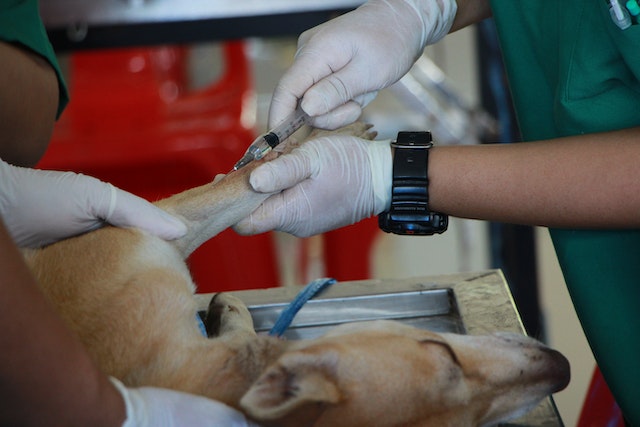How to get rid of worms in dogs? the question that you search for an answer to relieve your lovely dog from any illness complications and keep it healthy and active.
When your dog grows up it is susceptible to being infected by different types of worms that may cause many problems but before you know how to get rid of worms in dogs you should know some points such as types of worms, symptoms, and diagnosis.

Types of worms in dogs
Before you know how to get rid of worms in dogs you should know the types of these worms.
Five types of worms commonly infect dogs including roundworms, tapeworms, hookworms whipworms, and heartworms and they are different from each other in shape route of transmission and signs as the following:
Roundworms
One of the most common intestinal worms.
Transmitted in different ways and may be transmitted through the placenta from the mother to her puppies.
Also may be transmitted by ingestion of infected eggs or infected hosts such as rabbits, rodents, and birds.
Tapeworms
They are intestinal parasites transmitted mainly by eating infected fleas or eating wild animals infected by fleas.
Mainly doesn't cause problems for dogs.
Tapeworm segments can be passed in the dog's stool and be visible as a piece of rice.
Hookworms
It's a small aggressive worm that causes a lot of damage as a blood-sucking parasite causing anemia and may be fatal in puppies.
Transmitted by eating hookworm larvae from the environment.
In some cases, it is transmitted by ingestion of the mother's milk.
Diagnosed by fecal flotation test of the stool sample.
Whipworms
It's a large one so they are visible to the naked eye.
Lives in cecum and colon and passed egg to dog fecal matter.
Mainly causes trouble to dogs in severe cases such as diarrhea, weight loss, bloody stool, and occasionally death.
Diagnosed by fecal samples examination but we should repeat fecal examination because it isn't easy to find eggs and give us false negative results.
Heartworms
The most worrisome and preventable worm.
Mainly transmitted by mosquitoes so, to know how to get rid of worms in dogs you should avoid these mosquitoes.
It multiplies through the heart causing heart failure and lung diseases and may lead to death so vets recommended regular heartworm prevention.

Symptoms of worms in dogs
If you want to know how to get rid of worms in dogs you should know the common main symptoms caused by these worms:
-
Diarrhea
-
Abdominal pain
-
Weight loss
-
Anemia
-
Vomiting
-
Dehydration
-
Poor coat appearance
-
Bloody stool
-
Nutrition deficiency
-
Respiratory signs such as coughing intolerance for exercise, especially with infection by heartworms and in severe cases cause pale gum labored breathing and may lead to death
Diagnosis of worms in dogs
Diagnosis is very important to help us to find the way how to get rid of worms in dogs and help the veterinarian to prescribe the perfect treatment.
In the case of tapeworms, we can see the segments passed in the dog's stool as a piece of rice.
Diagnosis of other intestinal worms by stool microscopic examination to look for eggs.
Diagnosis of heartworms by blood test and sometimes by radiograph and ultrasound.

How to get rid of worms in dogs
In two ways prevention and treatment:
Prevention
Prevention and good hygiene is very important and is the beginning of the answer to the question " how to get rid of worms in dog" As the following:
Flea control is a crucial step, especially in the case of tapeworms.
Mosquitoes control is a very important way to prevent heartworms
Disinfect food and water Powell regularly.
Treatment
When you ask your veterinarian how to get rid of worms in dogs after his perfect diagnosis he will prescribe suitable deworming medications to treat different types of heartworms and intestinal parasites.
You should treat your young puppies for roundworms and also tapeworms with deworming medications which should be repeated after 2 weeks.
Deworming for dogs
When you ask how to get rid of worms in dogs the answer is deworming.
Deworming is the use of anthelmintics as a defense line to tell us how to get rid of worms in dogs.
Deworming drugs vary in action and parasites act against them.
Some of these cause muscle spasms and paralyze the worm that is excreted with stool but some of it is still alive.
Others stop cell division and kill the parasite.
Some deworming medications have broad-spectrum action and others are specific.
Examples of deworming medications are fenbendazole, febantel, ivermectin, and praziquantel.
Deworming is very important to your dog as it is susceptible to infection and others have an infection with no infection signs as asymptomatic dogs act as a source of infection and also very important for us as a protection from zoonotic disease.
Method of deworming
In case of diagnosis of which type of worms, you should ask your vets for specific deworming medications.
But as your dog was susceptible to being infected at any time we should give anthelmintic drugs to your dog year-round to prevent infection.
We should give deworming agents for puppies at 2 weeks old and repeat every 2 weeks until they become 8 weeks old and the same for their mother.
Other dogs should take their deworming agent every month.
Deworming Side effects
Dewormers seem to be quite safe.
Some Side effects may occur:
-
Diarrhea
-
Vomiting
-
Lack of appetite
-
Excess salivation
If other side effects appear you should call your vets.
Dog deworming considerations
• A dewormed dog is not covered against reinfection.
• You should give the deworming medications as prescribed for the full duration of treatment.
• You should clean the dog's environment during the deworming process and pick up the stool immediately.
• You should wash your hands after deworming medications administration.
• You should maintain the health of your dog with good nutrition and more exercise that protects against parasite infestation.
Deworming cost
The cost of deworming medications varies among the pet's clinic, product, dog weight, type of worm infection, and duration of treatment.
For example, heartworms cost more than other worms.
So by the deworming process now you know how to get rid of worms in dogs.

Summary
Finally, prevention through hygienic control and perfect diagnosis with receiving the ideal medications and good nutrition leads to the perfect way that helps us to answer the question " How to get rid of worms in dogs? "


You must be logged in to post a comment.